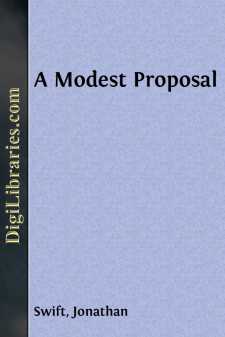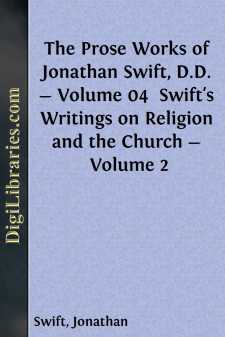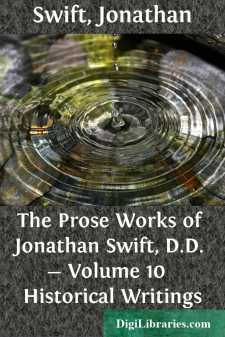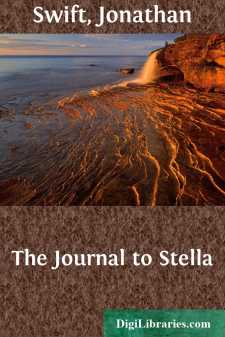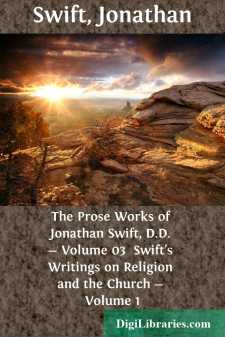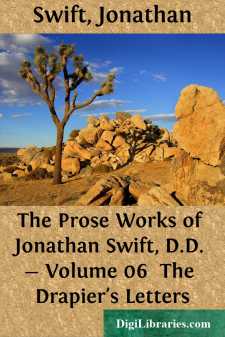Categories
- Antiques & Collectibles 13
- Architecture 36
- Art 48
- Bibles 22
- Biography & Autobiography 815
- Body, Mind & Spirit 144
- Business & Economics 28
- Children's Books 18
- Children's Fiction 14
- Computers 4
- Cooking 94
- Crafts & Hobbies 4
- Drama 346
- Education 58
- Family & Relationships 59
- Fiction 11835
- Games 19
- Gardening 17
- Health & Fitness 34
- History 1378
- House & Home 1
- Humor 147
- Juvenile Fiction 1873
- Juvenile Nonfiction 202
- Language Arts & Disciplines 89
- Law 16
- Literary Collections 686
- Literary Criticism 179
- Mathematics 13
- Medical 41
- Music 40
- Nature 180
- Non-Classifiable 1768
- Performing Arts 7
- Periodicals 1453
- Philosophy 65
- Photography 2
- Poetry 896
- Political Science 203
- Psychology 44
- Reference 154
- Religion 515
- Science 126
- Self-Help 85
- Social Science 83
- Sports & Recreation 34
- Study Aids 3
- Technology & Engineering 59
- Transportation 23
- Travel 463
- True Crime 29
Jonathan Swift
Jonathan Swift (1667-1745) was an Anglo-Irish satirist, essayist, and clergyman best known for his works "Gulliver's Travels" and "A Modest Proposal." Renowned for his sharp wit and keen social commentary, Swift's writings often critiqued the political and social issues of his time. He held various clerical positions within the Church of Ireland, ultimately becoming the Dean of St. Patrick's Cathedral in Dublin.
Author's Books:
Sort by:
by:
Jonathan Swift
It is a melancholy object to those, who walk through this great town, or travel in the country, when they see the streets, the roads and cabbin-doors crowded with beggars of the female sex, followed by three, four, or six children, all in rags, and importuning every passenger for an alms. These mothers instead of being able to work for their honest livelihood, are forced to employ all their time in...
more...
by:
Jonathan Swift
In the "foreword" to the reprint of this tract in the "Miscellanies" of 1711, Swift remarks: "I have been assured that the suspicion which the supposed author lay under for writing this letter absolutely ruined him with the late ministry." The "late ministry" was the Whig ministry of which Godolphin was the Premier. To this ministry the repeal of the Test Act was a...
more...
by:
Jonathan Swift
INTRODUCTION Of late years, that is to say, within the last thirty odd years, there has existed a certain amount of doubt as to whether or no the work known to us as "The History of the Four Last Years of the Queen," was really the product of Swift's pen. That a work of this nature had occupied Swift during his retirement at Windsor in 1713, is undoubted. That the work here reprinted from...
more...
by:
Jonathan Swift
INTRODUCTION Swift has been styled the Prince of Journalists. Like most titles whose aim is to express in modern words the character and achievements of a man of a past age, this phrase is not of the happiest. Applied to so extraordinary a man as Jonathan Swift, it is both misleading and inadequate. At best it embodies but a half-truth. It belongs to that class of phrases which, in emphasizing a...
more...
by:
Jonathan Swift
PREFACE The history of the publication of the Journal to Stella is somewhat curious. On Swift's death twenty-five of the letters, forming the closing portion of the series, fell into the hands of Dr. Lyon, a clergyman who had been in charge of Swift for some years. The letters passed to a man named Wilkes, who sold them for publication. They accordingly appeared in 1766 in the tenth volume of Dr....
more...
by:
Jonathan Swift
A LETTER FROM CAPTAIN GULLIVER TO HIS COUSIN SYMPSON. Written in the Year 1727. I hope you will be ready to own publicly, whenever you shall be called to it, that by your great and frequent urgency you prevailed on me to publish a very loose and uncorrect account of my travels, with directions to hire some young gentleman of either university to put them in order, and correct the style, as my cousin...
more...
by:
Jonathan Swift
PREFACE. The inquiry into the religious thought of the eighteenth century forms one of the most interesting subjects for speculation in the history of the intellectual development of western nations. It is true, that in that history Swift takes no special or distinguished part; but he forms a figure of peculiar interest in a special circle of his own. Swift had no natural bent for the ministry of a...
more...
by:
Jonathan Swift
LETTER I. TO THE SHOP-KEEPERS, TRADESMEN, FARMERS, AND COMMON-PEOPLE OF IRELAND. NOTE About the year 1720 it was generally acknowledged in Ireland that there was a want there of the small change, necessary in the transaction of petty dealings with shopkeepers and tradesmen. It has been indignantly denied by contemporary writers that this small change meant copper coins. They asserted that there was no...
more...
by:
Jonathan Swift
Predictions For The Year 1708 Wherein the month, and day of the month are set down, the persons named, and the great actions and events of next year particularly related, as will come to pass. Written to prevent the people of England from being farther imposed on by vulgar almanack-makers. By Isaac Bickerstaff, Esq. I have long consider'd the gross abuse of astrology in this kingdom, and upon...
more...


